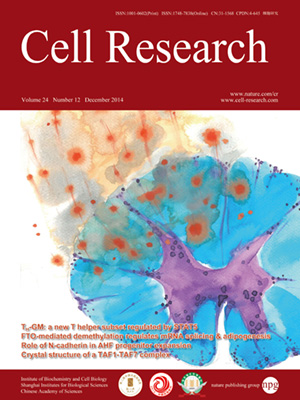
Volume 24, No 12, Dec 2014
ISSN: 1001-0602
EISSN: 1748-7838 2018
impact factor 17.848*
(Clarivate Analytics, 2019)
Volume 24 Issue 12, December 2014: 1466-1485
ORIGINAL ARTICLES
Characterization of Nestin-positive stem Leydig cells as a potential source for the treatment of testicular Leydig cell dysfunction
Mei Hua Jiang1,2,3,*, Bing Cai2,4,*, Ying Tuo2,5,*, Jiancheng Wang2, Zhi Jun Zang6, Xiang'an Tu7, Yong Gao4, Zhijian Su8, Weiqiang Li2,9, Guilan Li2, Min Zhang2, Jianwei Jiao10, Zi Wan7, Chunhua Deng7, Bruce T Lahn2 and Andy Peng Xiang1,2,3,4,9
1Cell-gene Therapy Translational Medicine Research Center, The Third Affiliated Hospital, Zhongshan School of Medicine, Sun Yat-sen University, Guangzhou, Guangdong 510630, China
2Key Laboratory for Stem Cells and Tissue Engineering, Center for Stem Cell Biology and Tissue Engineering, Ministry of Education, Sun Yat-sen University, Guangzhou, Guangdong 510080, China
3Department of Anatomy, Zhongshan School of Medicine, Sun Yat-sen University, Guangzhou, Guangdong 510080, China
4Reproductive Medicine Center and Guangdong provincial Key Laborartory of Reproductive Medicine, Sun Yat-sen University, Guangzhou, Guangdong 510080, China
5Department of Histopathology,The First Affiliated Hospital, Sun Yat-sen University, Guangzhou, Guangdong 510080, China
6Department of Infertility and Sexual Medicine, The Third Affiliated Hospital, Sun Yat-sen University, Guangzhou, Guangdong 510630, China
7Department of Urology, The First Affiliated Hospital, Sun Yat-Sen University, Guangzhou, Guangdong 510080, China
8Key Laboratory of Bioengineering Medicine of Guangdong Province, Institute of Biomedicine, Jinan University, Guangzhou, Guangdong 510632, China
9Department of Biochemistry, Zhongshan School of Medicine, Sun Yat-sen University, Guangzhou, Guangdong 510080, China
10State key Laboratory of Reproductive Biology, Institute of Zoology, Chinese Academy of Sciences, Beijing 100101, China
Correspondence: Andy Peng Xiang, Tel: +86-20-87335822; Fax: +86-20-87335858 (xiangp@mail.sysu.edu.cn)
The ability to identify and isolate lineage-specific stem cells from adult tissues could facilitate cell replacement therapy. Leydig cells (LCs) are the primary source of androgen in the mammalian testis, and the prospective identification of stem Leydig cells (SLCs) may offer new opportunities for treating testosterone deficiency. Here, in a transgenic mouse model expressing GFP driven by the Nestin (Nes) promoter, we observed Nes-GFP+ cells located in the testicular interstitial compartment where SLCs normally reside. We showed that these Nes-GFP+ cells expressed LIFR and PDGFR-α, but not LC lineage markers. We further observed that these cells were capable of clonogenic self-renewal and extensive proliferation in vitro and could differentiate into neural or mesenchymal cell lineages, as well as LCs, with the ability to produce testosterone, under defined conditions. Moreover, when transplanted into the testes of LC-disrupted or aging models, the Nes-GFP+ cells colonized the interstitium and partially increased testosterone production, and then accelerated meiotic and post-meiotic germ cell recovery. In addition, we further demonstrated that CD51 might be a putative cell surface marker for SLCs, similar with Nestin. Taken together, these results suggest that Nes-GFP+ cells from the testis have the characteristics of SLCs, and our study would shed new light on developing stem cell replacement therapy for testosterone deficiency.
10.1038/cr.2014.149
FULL TEXT | PDF
Browse 2477


